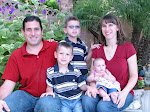I began my new ministry in Portales with a sermon on unity from John 17, which contains the great prayer of unity offered by Jesus before his crucifixion. Just like many concerned Christians, I have often thought about unity, but have rarely come up with any novel approaches to address the division that is throughout Christendom.
Usually when this topic is addressed to a particular divided group, John 17 is highlighted and an emotional appeal is articulated for Christians to honor the prayer of Jesus and just be united. Complimenting this appeal is usually some proclamation that our differences are for the most part petty and that what we have in common is far more precious than what we don't. This kind of approach usually gets the gathered emotionally committed to unity. There is a spirit of repentance and togetherness. The songs and prayers are accompanied by tears and embrace. Someone will usually say this is a glimpse of heaven.
But then those of the gathered assembly go their separate ways and we have to ask the question: was any real unity accomplished? Christian Church and Churches of Christ had a round of such gatherings in 2006 --marking the hundred year anniversary of their split. They repudiated such a split and affirmed all they had in common, but is that unity?
I have a couple of problems with making unity the end goal of our efforts: one practical and one theological. The practical concern involves trying to decide what unity looks like. Unity becomes an ambiguous ideal, one that no one is ever sure when it is truly accomplished. Speakers that often opine about unity rarely will tell their audience "we will know that we are united when..." Would we all have to worship together on Sundays for this ideal to become reality? Or is unity merely acknowledging we have the same Savior and that we won't throw spiritual stones at each other anymore (this would certainly be an improvement)? The only worthy vision of unity, in my view, is the one in which we can all assemble as one people to praise the Lamb on the throne (cf. Rev. 5). I don't know that we can get there this side of eternity.
My theological concern is that as I read scripture, unity is not something we can accomplish. This has been played out in our own Restoration history. Declaration and Address was signed just over 200 years ago by Thomas Campbell and others with the vision that all denominational lines would simply dissolve into the greater union of believers. Sounds great, but the patternist approach--the idea that we would all be unified by simply following a supposedly obvious New Testament pattern--was ultimately doomed to add more factions than it would ever contribute to the cause of unity.
Rather unity is given and accomplished by God through the work of Christ and the Holy Spirit. Go back and read John 17. Is there any place in that prayer that calls on the disciples to create unity? Go read Eph. 4:3, "Make every effort to keep the unity of the Spirit through the bond of peace." Our role in unity is to maintain what has already been created and given. We do not create unity, though we certainly can and do create division.
So, does this mean we can do nothing regarding the division we see throughout Christendom or even amongst our fellowship and congregations? Absolutely not. We can begin to make strides in enjoying greater unity when we realize that such unity is given by Jesus and not created by us. We can better focus then on being the disciples and the church we are supposed to be and when this begins to happen unity amongst ourselves and others will increase. We don't rally around unity; we rally around the cross. But when you find a whole lot of disciples at the cross, you will find them united!
Obviously, where we have contributed to division and factions we need to repent, be humble, and ask for forgiveness. This will allow the gift of God's unity to wash away the walls of division and hostility that we have erected. We can't solve the division we see all around us and around this world, but perhaps we can start with this humility and seek to enjoy the unity already given to us in Christ Jesus!
Wednesday, January 13, 2010
Subscribe to:
Post Comments (Atom)

2 comments:
Jesus calls us to remain in the unity which follows from each of us in the exact same way obeying the gospel. Those who create division do so by adding unscriptural requirements for fellowship. We can't create unity. It already exists. We CAN create division. Those who create division may do so for excellent reasons--reasons that seem excellent to them at least. Those interested in seeking the fault in sectarianism within the Restoration reformation should examine carefully the multiplied sects within that part of the movement which added an anti-instrument law to apostolic doctrine. Once one law is added, there seems to be no barrier to making more and more laws, none of which are part of the gospel of Christ.
Ray,
Good to hear from you. It has been a long time. You have spoken well regarding the way we proliferate our divisions. May God bring us to repentance and restore us to the unity he has so blessed us with.
Post a Comment